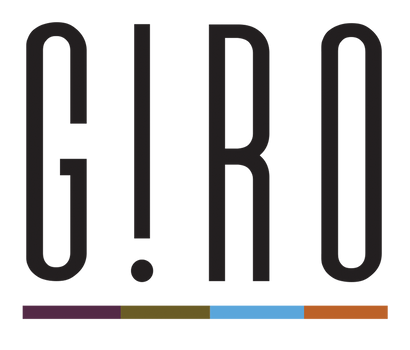G!RO // Pete's Coffee Blog // Part 2

All of our coffee comes from Woking, with its world famous plantations, producing the best coffee on its sun drenched slopes. Only some of that sentence is true of course, but our coffee does come via Woking, with everything we serve at Giro having been roasted by Edward at Beanberry. Small batch roasting and speedy delivery ensures optimum freshness and that means better coffee for you guys.
The beans are organic as standard, as, frankly “coffee deserves to be nurtured as nature meant it to be”, and Edward feels it tastes better as well. He goes into detail about the harmful effects of many of the modern, industrialised techniques on his website, but I thought I would highlight a few here, as they are the same reasons why we serve organic coffee at Giro. Namely that fertilizers and pesticides damage the soils and local ecosystems where they are used, and harm not just animals, but also the very people who are growing the coffee. Damage to water supplies is common, especially in the tropical conditions in which coffee is often grown, with lots of rainfall meaning lots of contaminated soil being washed into streams and drinking water sources.
Edward sums up our shared ethos nicely:
“When buying organic we create incentives for the increasing number of coffee growers to move to organic agriculture, leading over time to better environment at origin and higher living standards within the coffee growing communities.”
The goal of ensuring that the very people who grow our coffee remain healthy is aided by choosing only the best sources as well. Edward believes that the organic label, and the farming practices that this encourages, also has a beneficial effect on growing communities, and while not having the Fairtrade label, all of our coffee is ‘fairly traded’. To give one example, our Yirgacheffe coffee “light roast drip, or #3” from Ethiopia,
“is sourced from Oromia Coffee Farmers Cooperative Union (OCFCU), which represents some 217 cooperatives with over 200,000 members. OCFCU aims to help smallholder coffee farmers to take advantage of the Fair Trade market. OCFCU returns 70% of its net profit back to the cooperatives, and cooperatives back to their members.”
(Origin of our coffee (as of 30th Jan 2014) Source: Made by Pete)
So there you have it- our coffee is organic and therefore tastier and more environmentally and socially friendly because of this.
After explaining where we get our coffee from, I felt it would be useful to ask Jordan exactly why we have chosen the coffee we have.
Q. Why have we chosen Beanberry, and therefore organic coffee?
"When we decided to set up G!RO, our goal was to serve the finest quality coffee that we could. As simple as that. We were fortunate to be introduced to Edward through our good friends at Pinnocks Coffee House in Ripley. After meeting Edward, and hearing his passion for ethically sourced, speciality coffee we felt very confident that his coffee would be a good fit, but of course its all in the tasting…and what we tasted was very very good!! And the rest, as they say, is history.
Beanberry offers a unique approach to roasting due to the small-batch roasts. Every coffee that we serve comes from beans that have been recently roasted, specifically for us - we are not purchasing off the shelf, or from large batches. Edward’s expertise and experience allows him to extensively profile each bean variety to bring out it’s best qualities in the roast. Our espresso blend ‘G!ROPRESSO' has been tailor-made for G!RO , and our drip coffees are on rotation depending on what beans are in season.
All of this adds up to having a great working relationship, to serve the finest organic speciality coffee! It sounds cheesy, but we really do stand by our coffee for its taste, quality and finesse. The fact that all of the coffee we serve is organic is something we are very proud of. "
Q. What else is done at Giro to help communities / the environment?
“As well as serving organic coffee, all the milk that we serve in our drinks is also Organic (even the Soy milk!- Pete). We also try to source our food and produce locally. It is important to us to support local business and independents wherever possible.
Community is something that is at the heart of G!RO and why we exist. The people that come into the cafe - you, the lovely customers - are more important to us than the bricks and mortar of the cafe itself. As well as offering organised rides for people to get involved - check twitter and facebook , we have started some beginners rides, and are looking to become involved with grass roots cycling with local schools.
We will shortly be launching a new ‘G!RO // Give A Coffee’ scheme that will give customers the opportunity to support and sponsor free coffee mornings for local charities that we will host here at G!RO. There are a number of local charities and hospices that are close to our heart, and we would love to be able to provide free coffee mornings for those charities as a way to use what we have in our hands to give something back. We are still in the process of sorting out the logistics of this, but will keep you up to date with any proceedings.”
I hope this brief look at the coffee industry, and how we at Giro have chosen the coffee we have has been interesting. More importantly, I trust it has clearly highlighted why the premium paid for quality, independently roasted and served coffee is worth it, not only for your taste buds, but also for the communities producing the beans, and the health of the environment they live in.
The moral of the story? Shun instant ‘coffee’, come to Giro, drink fantastic and organic Beanberry roasted coffee, and save the world at the same time!
Leave a comment
Comments will be approved before showing up.
Also in The Coffee Bean
G!RO // Pete's Coffee Blog // Part 3
 My post-G!ro time saw me travel to Sierra Leone to lead a group of British and Sierra Leonian volunteers as part of the ICS programme. Working in Freetown's slums with at-risk youth, sex workers and the unemployed, the work was challenging but rewarding, and in many areas did indeed lead to positive, sustainable changes // Which is all well and good, but what does this have to do with coffee, I hear you ask. Sierra Leone has long grown and exported coffee, never in any great volume, or to much acclaim. Post civil-war, there have been great efforts to make the production ethical and beneficial, with examples such as this clearly pointing to a positive future for those in the eastern, coffee production areas, which were most devastated by the war. However, this has not lead to a domestic market for the stuff, with coffee in Sierra Leone, if you can find it at all, guaranteed to be a weak cup of Nescafe, lots of sugar, and powdered milk. Despite the large Lebanese community (and NGO workers), tea, or the plentiful cheap beer are far more popular.
My post-G!ro time saw me travel to Sierra Leone to lead a group of British and Sierra Leonian volunteers as part of the ICS programme. Working in Freetown's slums with at-risk youth, sex workers and the unemployed, the work was challenging but rewarding, and in many areas did indeed lead to positive, sustainable changes // Which is all well and good, but what does this have to do with coffee, I hear you ask. Sierra Leone has long grown and exported coffee, never in any great volume, or to much acclaim. Post civil-war, there have been great efforts to make the production ethical and beneficial, with examples such as this clearly pointing to a positive future for those in the eastern, coffee production areas, which were most devastated by the war. However, this has not lead to a domestic market for the stuff, with coffee in Sierra Leone, if you can find it at all, guaranteed to be a weak cup of Nescafe, lots of sugar, and powdered milk. Despite the large Lebanese community (and NGO workers), tea, or the plentiful cheap beer are far more popular.
G!RO // Pete's Coffee Blog // Part 1

Welcome to a brief two part look at the international coffee industry, which will hopefully prove interesting!
Part one is concerned with a general introduction to coffee production and distribution, as well as a look at the UK’s coffee drinking habits. In part two, Jordan (Giro co-owner) and Edward (our local roaster) will explain more about the coffee we serve at Giro, and what we are doing to help alleviate some of the environmental and social issues associated with the production of coffee. The aim for this series is to not simply be a thinly veiled infomercial for how amazing our coffee is, but rather a genuine look at the processes that are involved, and the avenues open to smaller, independent roasters and coffee houses.
